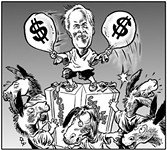Capitol Chronicle: Blame It on the Kids
When You're Looking for Tax Dollars, Consider the Little Ones
By Michael King, Fri., Feb. 1, 2002
Budget crunches didn't stop Gov. Perry from announcing Monday a $175 billion transportation plan: the "Trans Texas Corridor," complete with futuristic graphics showing 4,000 miles of high tech "corridors" crisscrossing the state, a vast network of right-of-ways to be acquired and filled over the next 50 years with toll roads, high-speed passenger and freight rail, etc. etc. Setting aside the advisability of this Herculean project, how will we pay for such an imperially Roman endeavor? Perry promised no new taxes, but the "toll roads" contradict him. Highway tolls are yet another form of regressive taxation, designed to push the burden of public costs downward onto the average taxpayer/driver, while the lion's share of the benefits go to the industries demanding state-subsidized mobility and infrastructure. (By the way, last year the same industries heavily promoted the passage of the constitutional amendments allowing the state to borrow for highway construction.)
An instant measure of the high-roller enthusiasm for Perry's proposal was the simultaneous press release by the Texas Public Policy Foundation, darling of the business lobby, which described Perry's plan -- in the words of mass-transit bogey Wendell Cox -- as "ambitious and visionary." Ambitious it certainly is, and as The Dallas Morning News impertinently pointed out a day later, the "Corridor" promises to reward Perry's major corporate contributors with splendid financial bonanzas far into the new century. "Highway contractors, chemical pipeline executives and financial bond firms that stand to benefit from the plan," reported Wayne Slater, "have contributed more than $300,000 to Mr. Perry." A coincidence, no doubt.
The Other Side of the Coin
A couple of weeks ago, unaccompanied by TV-friendly graphics and little noticed in the press, the commissioner of Health and Human Services announced that the state's Children's Health Insurance Program, which provides health care to children of working-poor families, is projected to show a $100 million deficit for the biennium. Increased enrollment of the more than one million Texas kids without insurance, and greater health-care usage than anticipated, is creating the shortfall. But it could be worse. The program is funded three to one by the federal government, so Texas would have to pony up a paltry $29 million to continue enrolling in C.H.I.P. every child who needs it, while bringing much more money into the state.
However, faced with the governor's "belt-tightening" rhetoric and a directive that all agencies find ways to cut expenses for next year, the commissioner came to the Legislature with a handful of proposals for how to slash C.H.I.P. These included freezing enrollment, putting kids on a waiting list, delaying start dates for coverage, and reducing the length of the automatic enrollment. That is, save money through "rationing by inconvenience": Keep the kids from getting adequate insurance. As a plan, it isn't ambitious or visionary, but it would get the job done -- while simultaneously costing taxpayers more money in emergency health care all across the state.
Fortunately, according to Austin state Rep. Glen Maxey, when the commission brought these proposals before the House appropriations subcommittee last week, the response was less than enthusiastic. Noting that there are always interim "shortfalls" in the budget, Maxey said, "I believe that it's way early for anyone to be thinking that we have to do anything draconian to this program. The commission clearly got direction from downtown [the guv's office] to make sure the program stays within budget. So this is the result." Maxey pointed out that after a lengthy fight, the 2001 Lege succeeded in matching Medicaid procedures (for even poorer children) to those of C.H.I.P., and the commission's proposals would do the reverse for C.H.I.P. "The Medicaid simplification begins as of Feb. 1," said Maxey, "and it's bizarre to me that all of a sudden we have proposals to bring down CHIP to the previously sorry state of Medicaid."
Maxey, who's retiring at the end of this year, believes C.H.I.P. retains enough legislative support to stop these particular cuts, and that the funding will be found. But he added that as next year's session approaches, we will hear more and more about how we have to cut this or that health and human services program in order to balance the budget. "Those are the typical ways to do it," Maxey concluded. "Cut the weakest first."
Calls to the governor's press office, to see whether Gov. Perry supported the proposals to ration children's health insurance, were not returned. That's understandable: There were all those charts, posters, and press releases to prepare, about carrying the state forward into the 21st century, on the Trans-Texas Corridor.
Got something to say on the subject? Send a letter to the editor.








